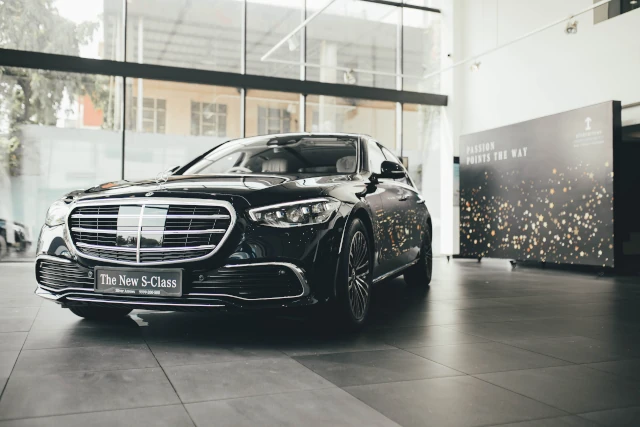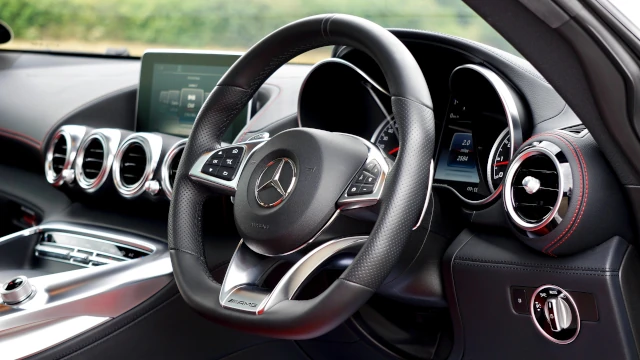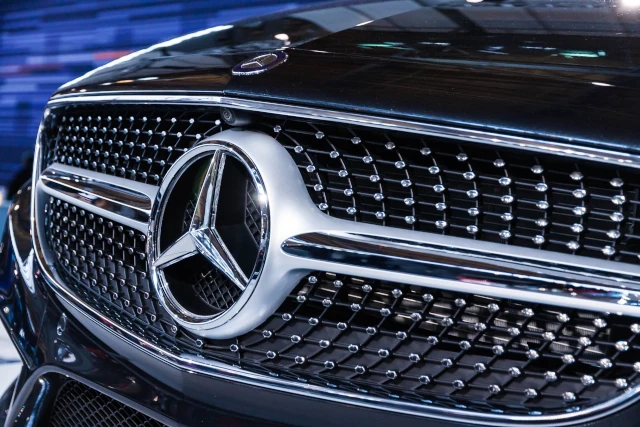Mercedes-Benz, a renowned global automobile brand, has long been a symbol of luxury, quality, and cutting-edge technology. Their marketing strategy is a fascinating study of how a premium brand navigates the competitive landscape of the automotive industry. Let’s look into key elements of Mercedes-Benz’s marketing strategy, uncovering the tactics and philosophies that have helped them maintain their prestigious position in the market.

Targeting a Premium Market Segment
Mercedes-Benz’s marketing strategy begins with a clear focus on targeting a premium market segment, a move that has defined the brand’s direction and appeal. This high-end positioning is not just about the price point; it extends to every facet of their brand identity and customer experience. By consistently catering to a demographic that values luxury and exclusivity, Mercedes-Benz has cultivated an image that resonates with consumers seeking more than just a vehicle, but a symbol of success and refinement.
The company’s approach to targeting this segment is multifaceted. At the core, their vehicle designs exude elegance and sophistication, appealing to those who view their car as a reflection of their personal brand and status. The advanced technology and superior craftsmanship that go into every Mercedes-Benz car speak directly to consumers who prioritize innovation and quality in their purchases.
Understanding the aspirations and lifestyles of their target audience, Mercedes-Benz also crafts its marketing messages to resonate with these values. Their advertising campaigns, for example, often feature imagery and narratives that evoke a sense of luxury, achievement, and exclusivity. These efforts are not just about showcasing their cars but are part of a broader strategy to build and maintain a brand that aligns with the aspirations of their target market.
This deliberate targeting strategy has allowed Mercedes-Benz to not only attract a loyal customer base but also command a premium in the market. It’s a testament to the power of brand perception and the importance of aligning product offerings with customer expectations. Mercedes-Benz’s success in this regard serves as a benchmark in the automotive industry, demonstrating the effectiveness of a well-executed premium market segmentation strategy.
Innovative Product Development
Innovation stands at the forefront of Mercedes-Benz’s product development strategy, a key factor that distinguishes the brand in a competitive automotive market. Known for pioneering numerous technological advancements, Mercedes-Benz has consistently introduced features that set new industry standards. This focus on innovation extends beyond mere functionality, encompassing safety, performance, and luxury. For instance, their introduction of advanced driver-assistance systems and electric vehicle technology showcases their commitment to not just keeping pace with, but leading industry trends.

The brand’s dedication to innovation is not a recent development; it’s deeply ingrained in their history. Mercedes-Benz has a long-standing reputation for introducing groundbreaking technologies in their vehicles, from pioneering safety features like anti-lock braking systems to the latest in infotainment and connectivity. These innovations are not just about technical superiority; they are carefully designed to enhance the driving experience, ensuring that each Mercedes-Benz car delivers performance, comfort, and safety at the highest level.
This commitment to innovation serves multiple purposes for the brand. It appeals to tech-savvy consumers who seek the latest advancements in their vehicles. At the same time, it reinforces the brand’s image as a leader in the automotive sector, constantly pushing the boundaries of what is possible in automotive design and technology. Mercedes-Benz’s innovative approach is a critical component of their marketing strategy, cementing their position as a brand synonymous with automotive excellence.
Brand Positioning and Image
Mercedes-Benz has masterfully crafted an image that exudes sophistication, luxury, and high status, a cornerstone of their marketing strategy. This brand positioning transcends the mere selling of cars; it’s about selling a lifestyle, a set of values, and a status symbol. Their vehicles are not just modes of transportation but are perceived as extensions of the personal identities of their owners. This powerful brand image is a result of consistent messaging, high-quality products, and a deep understanding of the aspirations of their target audience.
The brand’s image is carefully curated through various channels. Their advertising campaigns, for example, are more than just showcases of their vehicles’ features. They tell a story, one that resonates with the desires and aspirations of their audience. The use of elegant and refined imagery, coupled with narratives that speak of success, achievement, and exclusivity, reinforces the brand’s luxurious image. These advertisements are not just seen; they are experienced, leaving a lasting impression on the viewer.
The sophistication of Mercedes-Benz is also reflected in the design of their cars. From sleek exteriors to plush interiors, every detail is meticulously crafted. This attention to detail is not solely about aesthetics; it also speaks to the brand’s commitment to quality and excellence. Owning a Mercedes-Benz car is thus seen as a hallmark of taste and discernment, appealing to consumers who seek the finest things in life.
In addition to their products and advertising, Mercedes-Benz extends this image of luxury to every customer touchpoint. Their dealerships are designed to offer a premium experience, from the layout and decor to the level of customer service provided. This comprehensive approach ensures that the brand’s image of luxury and quality is consistently reinforced, whether a customer is watching a commercial, browsing a showroom, or driving one of their cars.
This strong and consistent brand positioning has been instrumental in creating an emotional connection with their customers. For many, owning a Mercedes-Benz is not just about the car itself; it’s about what the car represents. It’s a symbol of achievement, a testament to one’s success and taste. This deep emotional resonance is what sets Mercedes-Benz apart in the automotive industry, sustaining their reputation as a premier luxury brand.
Mercedes Global Marketing with a Local Touch
Mercedes-Benz’s global marketing strategy is a fine blend of universal brand appeal with a sensitive understanding of local market dynamics. While the brand maintains its prestigious image worldwide, it smartly adapts its strategies to fit the unique cultural and economic landscapes of different regions. This localized approach is a key aspect of their success, enabling them to resonate with diverse consumer bases across the globe.

In each market, Mercedes-Benz tailors its marketing campaigns to reflect local tastes, preferences, and values. For instance, in markets where environmental consciousness is a priority, they may emphasize their advancements in electric vehicle technology and sustainable practices. In regions where luxury and status are particularly valued, their marketing might focus more on the prestige and sophistication of their vehicles. This tailored approach ensures that their messaging is not just seen but felt, creating a deeper connection with varied audiences.
The brand also pays close attention to the economic factors in each region. Pricing strategies, for example, are carefully adjusted to align with local purchasing power and market conditions. This level of sensitivity to local nuances is not commonplace in the global automotive industry and sets Mercedes-Benz apart, reinforcing their image as a globally aware and adaptable brand.
Through this combination of global consistency and local adaptation, Mercedes-Benz effectively communicates its brand values while respecting and embracing regional differences. This strategy not only enhances their global presence but also fosters a sense of inclusivity and relevance among consumers worldwide, contributing significantly to the brand’s enduring appeal and success.
Emphasis on Customer Experience
Mercedes-Benz places a significant emphasis on customer experience, understanding that the luxury of their brand extends far beyond the vehicles themselves. This focus is evident at every customer touchpoint, from the first interaction to post-purchase services. They recognize that exceptional customer experience is a crucial differentiator in the premium automotive market, where high expectations are the norm.
The customer experience journey with Mercedes-Benz starts with the dealership environment. These spaces are designed to be more than just car showrooms; they are experiential hubs where customers can immerse themselves in the world of Mercedes-Benz. The layout, décor, and ambiance of their dealerships reflect the brand’s commitment to luxury and quality, creating an environment that resonates with their target audience’s aspirations.

The brand’s dedication to customer service is equally impressive. Staff are not just knowledgeable about the products; they are trained to provide a level of service that matches the prestige of the brand. This includes personalized attention, understanding customer needs, and providing expert advice. The aim is to make every customer feel valued and respected, reinforcing the premium nature of the brand.
Moreover, Mercedes-Benz extends its focus on customer experience to after-sales services. They offer comprehensive support, including regular maintenance, repairs, and customer helplines, ensuring that owning a Mercedes-Benz is as hassle-free as it is prestigious. This commitment to customer care helps in building long-term relationships with customers, fostering brand loyalty and advocacy.
This holistic approach to customer experience is a vital component of Mercedes-Benz’s marketing strategy. By ensuring that every aspect of the customer journey is steeped in quality and luxury, they not only meet but often exceed customer expectations. This strategy has helped Mercedes-Benz maintain its position as a leader in the luxury automotive sector, with a reputation for not just selling cars, but delivering exceptional experiences.
Mercedes Digital Marketing and Social Media Presence
In the era of digital connectivity, Mercedes-Benz has adeptly embraced digital marketing and social media to enhance its brand presence and engage with a broader audience. This shift towards digital platforms is a strategic response to the evolving media consumption habits of consumers, especially the younger demographic. By leveraging these digital channels, Mercedes-Benz is able to showcase its brand story, product innovations, and corporate values in a dynamic and interactive manner.
The brand’s social media strategy is particularly noteworthy. Platforms like Instagram, Twitter, and Facebook are utilized not just to display their latest models or offer glimpses into the Mercedes-Benz lifestyle, but also to create a space for engagement and community building. Through these platforms, Mercedes-Benz interacts directly with its audience, sharing content that ranges from behind-the-scenes insights to user-generated content. This approach helps in humanizing the brand and fostering a sense of connection with its followers.
Digital advertising is another crucial component of their strategy. By employing targeted ads, Mercedes-Benz is able to reach potential customers with precision, ensuring that their marketing efforts are not only widespread but also effective. These ads are often tailored to the interests and behaviors of specific audience segments, increasing the relevance and impact of their messaging.
Additionally, Mercedes-Benz’s website plays a pivotal role in their digital marketing strategy. The site is not merely an information hub; it’s an extension of the brand’s luxury experience. With intuitive navigation, detailed product information, and immersive visuals, the website provides a digital experience that mirrors the sophistication and quality of their physical showrooms. It also serves as a platform for digital innovations, like virtual car tours and online consultations, enhancing the customer’s online journey.
This comprehensive digital marketing approach demonstrates Mercedes-Benz’s recognition of the importance of digital channels in today’s market. By effectively leveraging these platforms, they are able to reach a wider audience, engage with customers in meaningful ways, and stay relevant in an increasingly digital world. This digital savviness not only helps in attracting younger customers but also plays a crucial role in maintaining the brand’s image as a modern and forward-thinking automaker.
Sustainability and Social Responsibility
Recognizing the growing importance of sustainability and social responsibility, Mercedes-Benz has integrated these principles into their business model. This shift reflects a keen awareness of global environmental concerns and a commitment to being part of the solution. The brand has made significant strides in introducing eco-friendly practices and products, notably in the development of electric vehicles and sustainable manufacturing processes. This focus on sustainability appeals to a new generation of environmentally conscious consumers and enhances the brand’s appeal as a responsible and forward-thinking company.
Mercedes-Benz’s commitment to social responsibility extends beyond environmental initiatives. The brand actively engages in various community projects and philanthropic activities, reinforcing their position as a corporate citizen that values societal welfare. These efforts not only contribute to positive social change but also help in building a brand image that resonates with consumers who value corporate responsibility.
By integrating sustainability and social responsibility into their core business strategy, Mercedes-Benz is not just responding to market trends but is actively shaping a more sustainable future. This approach enhances their brand reputation and aligns with the evolving values of their customers, ensuring the brand remains relevant and respected in a changing world.
Mercedes-Benz Marketing Strategy in Summary
Mercedes-Benz’s marketing strategy is a sophisticated blend different tactics:
- Premium Market Segment Focus: Targeting affluent consumers seeking luxury, quality, and exclusivity in their vehicles.
- Innovation-Driven Product Development: Pioneering advanced technology and design in the automotive industry to maintain a competitive edge.
- Strong Brand Positioning: Cultivating an image of sophistication, luxury, and status, aligning with the aspirations of their target audience.
- Global Strategy with Local Adaptation: Tailoring marketing and product offerings to fit cultural and economic nuances of various regions.
- Emphasis on Customer Experience: Prioritizing superior customer service, dealership design, and after-sales support to enhance brand loyalty.
- Effective Digital Marketing and Social Media Presence: Utilizing online platforms for brand storytelling, customer engagement, and targeted advertising.
- Sustainability and Social Responsibility: Integrating eco-friendly practices and community involvement to appeal to environmentally and socially conscious consumers.
- High-Quality and Aesthetic Product Design: Ensuring that every vehicle reflects the brand’s commitment to luxury and excellence.
- Storytelling in Advertising: Creating emotive and aspirational narratives in marketing campaigns to strengthen brand connection.
- Long-term Customer Relationships: Focusing on building lasting bonds with customers, beyond the initial sale, to foster brand advocacy and loyalty.
These elements work together to uphold their status as a premium automotive brand and continue to attract a loyal customer base worldwide.
This approach offers valuable insights for businesses in any industry looking to establish a strong brand presence and build a lasting connection with their customers. Mercedes-Benz’s strategy demonstrates the power of consistent branding, customer focus, and adaptation to changing market dynamics.

